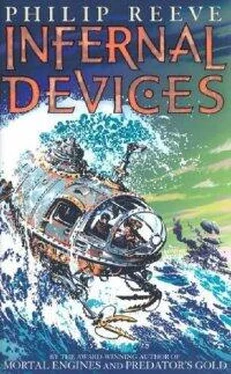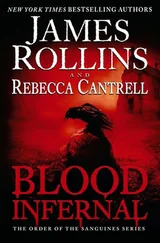Chapter 10
The Parent Trap
Usually at this time of year the raft resort of Brighton would have been cruising the Middle Sea, anchoring now and then so that visitors from the mobile towns and cities that prowled the shores could come out by balloon and motor launch to explore its amusement arcades and aquarium, its beaches and boutiques. But business had been poor these past few seasons, and so the Council had agreed to venture into the North Atlantic in search of parasite-pirates.
Now they were beginning to regret it. There had been much excitement when the first three limpets had made contact, east of the Azores. Crowds of visitors had come swarming out by airship from the cities of the Hunting Ground to see the strange new arrivals. But that had been weeks ago. There had been no sign of Lost Boys since, and the long banners that were stretched along the city’s bows, declaring WOPCART summer expedition and Brighton welcomes parasite-pirates, were starting to look tattered, and a little bit sad.
Fishcake brought the Autolycus up to periscope depth about a mile from Brighton. A night had passed since he’d first picked up the transmission from WOPCART. The morning sky was the color of the inside of a cowrie shell, and big gray waves heaved up and down. When Wren took a turn at the periscope, she could not see Brighton at all, just the waves, which now and then allowed her a glimpse of a big island away to windward, ringed by dirty white cliffs, with clouds hugging its summit.
And then she realized that it was not an island at all: What she had taken for cliffs were rows of white buildings, and the clouds were steam and exhaust fumes rising from a dense thicket of smokestacks. It was a city, a three-tiered raft city with two outrigger districts linked to its central hull by spidery gantries and a bank of huge paddle wheels beating the sea to foam astern. “Oh!” cried Wren, amazed. She’d seen pictures of cities in books, but she had never grasped how big they really were: far bigger than Anchorage-in-Vineland. Airships moved to and fro above a jagged skyline of spires and domes and rooftops, and a circular deck plate held up by immense gasbags hung a few hundred feet above the upper tier, anchored to it by thick hawsers. Wren could see green trees on the edge of the deck plate, and a building with unlikely onion domes.
“What’s that?” she gasped.
“That’s called Cloud 9,” said Fishcake, who had managed to get a picture of the city from a crab-cam that he had sent up to perch upon the periscope. He had fetched out the Autolycus’s tattered old copy of Cade’s Almanac of Traction Towns (Maritime Edition), and was comparing Ms. Cade’s diagram of Brighton with the image on the screen. “It’s a sort of airborne park. The big building in the middle is where the mayor of Brighton lives.”
“Gosh” breathed Wren. “I mean— Gosh!”
“No jaws,” said Fishcake, checking the screens to make sure Brighton had not added anything nasty since Cade’s Almanac went to press. There were a few air defense cannon mounted on revolving platforms on the promenades, but no more weapons than any town carried in these troubled times. “It’s just a pleasure resort.”
He lowered the periscope. As he switched off the crab-cam signal, the screens filled again with the transmission from Brighton, clearer and stronger now that the limpet was so close. “We only want a chance to see our dear lost boys again,” the woman from WOPCART was saying. Fishcake felt a silly, happy hopefulness rising up inside him. What if she was his mummy? Mums and dads are a chain that binds, a pain, a strain; they stop boys being boys. That’s what he’d been taught to chant down in the Burglarium. Now that he was faced with the prospect of meeting his own mum and dad, he found that he’d never really believed it. He’d been missing his parents his whole life long, and he’d not even known it until he heard the message from WOPCART.
He took the Autolycus deeper, nearer, down into the shadows beneath Brighton’s hull. Trailing cables and a huge, complicated steering array loomed out of the murk; green forests of weed swirled through the cone of light from the limpet’s nose lamp. Near the city’s bow, a metallic sphere dangled on cables; Fishcake guessed it was the machine that WOPCART used to transmit its message through the sea.
A metallic ping rang through the cabin. Wren thought that something must have fallen over in the hold, but the sound came again and then again, chiming out a rhythm, as if someone were carefully tapping the outside of the hull with a hammer.
“Oh, gods’” said Fishcake suddenly.
“What?” asked Wren. “What is that noise?”
Fishcake was frantically working the limpet’s controls, steering for brighter water beyond the edge of the city. “Gargle told us he ran into something like this once, under a big predator raft. It’s a type of Old Tech listening device… The mummies and daddies know we’re here now!” He wasn’t sure if he was scared or happy.
With a grinding clang the limpet lurched awkwardly sideways, throwing Wren off her feet. At first she thought it was because of something Fishcake had done. “You might have warned me,” she complained, rubbing the elbow she’d banged on a bulkhead. Then she saw that the boy looked just as startled as her.
“What’s happening?” she whispered.
“I don’t know, I don’t know]”
No mistaking the next sensation. The Autolycus was rising quickly upward. Water foamed white as it broke the surface, and sunlight burst into the cabin, blindingly bright after so many days in the dark. When Wren could see again, the limpet was hanging high above the waves and being swung sideways over a broad metal deck that jutted out from Brighton’s bow. People were running across the deck—not the smiley, well-dressed mums and dads she’d seen on the screens, but rough-looking, tough-looking men in rubberized overalls. Wren felt a jolt of fear at the sight of them. Then, looking past them, she relaxed, for overlooking the deck was a pleasant promenade, and the people lining the railings there looked much more like Parents of Children Abducted from Raft Towns: beaming, happy, pointing down excitedly at the limpet as it was dumped on the deck.
Fishcake was already halfway up the ladder that led to the hatch on the roof. As he popped it open, the sound of cheering burst into the limpet and a big amplified voice began shouting something, the words confused and echoey.
Wren followed him up the ladder. Out on the hull, Fishcake was crouched against the periscope mounting, looking nervously around, confused by the sunlight and the thundering cheers. The magnetic grapple that had dragged the limpet from the sea had been released and dangled dripping overhead, attached to the jib of a crane. The people on the promenade were shouting and cheering and waving their arms in the air. Wren touched Fishcake’s shoulder to reassure him. The rubber-suited men had formed a loose ring around the limpet and were closing in cautiously. Wren supposed they must be longshoremen or fishermen hired to pull limpets aboard. She smiled at them, but they did not smile back. Straining her ears, she began to make out what the booming voice was saying.
“… and for those of you who have just joined us,” it bellowed through squalls of feedback, “Brighton has captured a fourth pirate submarine! There are the crew, creeping out onto the hull—as desperate-looking a pair of young cutthroats as you could hope to meet! But don’t worry, ladies and gentlemen; the world will soon be rid of these parasites forever!”
“It’s a trap!” said Wren. Fishcake, who hadn’t understood what the announcer was saying, turned a shocked white face toward her. “It’s not real!” she cried, standing up, shouting. “Fishcake! It’s a—”
Читать дальше












